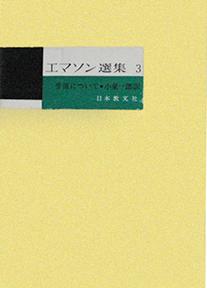PR
X
Calendar
Category
Hiekka aikaa
(731)Suomi
(322)Lappi
(53)Kuksa ククサ
(23)Luonto
(25)erämaa
(18)huomio
(162)muovimalli
(32)musiikki
(301)eläinpelastus
(79)veitset (knives)
(41)Olkoon voima kanssasi!
(35)剣の巻
(37)今は昔
(21)陽明学
(441)道家思想
(126)孫子兵法
(12)人鏡論
(13)海外通販/個人輸入
(26)日本独立計画
(49)隷属への道
(25)多目的道具
(206)現代甲冑考 - Modern Armors -
(80)実用物具考
(85)民間防具考
(177)民間防衛
(219)戦ふ日本刀
(97)實戦刀譚
(103)臨戦刀術
(94)古傳鍛刀術
(2)北欧
(118)西欧
(260)中欧
(35)彫金
(20)意匠
(58)『傭兵たちの挽歌』
(141)2011 jalkeen
(34)TORIAEZ
(11)Needle Felted Animals
(262)Weekly SAK
(597)Weekly SL
(485)Weekly EXP
(39)Keyword Search
▼キーワード検索
2024年12月
2024年11月
2024年10月
2024年09月
2024年08月
2024年11月
2024年10月
2024年09月
2024年08月
2024年07月
2024年06月
2024年05月
2024年04月
2024年03月
2024年06月
2024年05月
2024年04月
2024年03月
テーマ: 理力と共に(35)
カテゴリ: Olkoon voima kanssasi!

Photo By K9 Label
『エマソン選集3 生活について』
小泉一郎 訳 日本教文社 発行

"May the force be with you"
宇宙一元論と ラルフ・ウォルドー・エマソン 25
私たちが用いる英語という豊かな言葉が、
この世界の面〈おもて〉を表示すべき語をもっていないのは、
ふしぎなことに思われる。
Kinde [キンデ]というのは古い英語であるが、この語は、
微妙な未来の時制〈テンス〉をもつラテン語、
すなわち「まさに生まれんとする」という意味をもった、
あるいはドイツ哲学が「生成」という言葉で意味するところの、
natura [ナトゥーラ]という語の意味の半分をあらわすにすぎない。
ギリシャ語の Kosmos [コスモス]という語はこれを表現している。
だからフンボルト〔訳註・ドイツの科学者 1769 - 1859 〕が、
科学の最新の成果を再検討したその著書を
『宇宙〈コスモス〉』と題したのは、当を得ているのである。
日々とはこうしたものである。
大自然の無限の賜物を容れる盃〈さかずき〉であり、大空は蓋〈ふた〉なのだ。
が、 幻想 の力は私たちとともに生を受けて、最後まで私たちについてまわる。
朝〈あした〉から夕べにいたるまで、生まれてから死ぬまで、
私たちは、すかされたり、追従を言われたり、かつがれたりしているのだ。
このまどわしを見ぬいた昔の眼力は、いまどこにあるのだろう。
インド教徒は、ヴィシュヌ神のもつまどわしの力である摩耶〈マヤ〉を、
この神のおもな属性の一つとして表現している。
人生とは相戦う地水火風のまきおこす疾風ともいえるが、
この疾風のなかでは、あたかも嵐のなかで
水夫が船のマストや舷墻〈げんしょう〉にわが身をしばりつけるように、
人間の魂を人生というものに繫ぎとめることが必要だったのだ。
そのために自然は、なわや皮ひもとして、ある種の幻想を用いたのであった。
子供には、がらがら箱や人形や林檎を、
育ちざかりの男の子には、スケートや川やボートや馬や鉄砲を。
青年や大人の幻想をここに数えたてることはしまい。数えきれないほどあるからだ。
きわめてまれに、またおもむろに、仮面は落ち、人間のひとみは、
万物が同じもので出来ていて、ただ料理され化粧されて
多くのいつわりの外観をとったものにすぎないという事実を見ることを許される。
ヒューム〔訳註・スコットランド出身の哲学者。1711 - 76〕の説によれば、
周囲の状況はさまざまに変化するが、幸福の量は変わることがない。
生垣の下の日向で蚤〈のみ〉をつぶしている乞食も、
壮麗な馬車に乗って走り過ぎる王侯も、
生まれて初めて舞踏会に出るためによそおいを凝らした少女も、
討論の席から凱歌をあげて引きあげる雄弁家も、
手段こそ異なれ、同じ量の快よい興奮を感じているのだ__というのである。
この幻想という要素が大きな力を働かせて、
現在というもののもつ価値を蔽〈おお〉いかくそうとする。
俺は自分の最善の仕事より劣った仕事をしているのだと
いつも考えていない人間はひとりもないであろう。
「君は何をしてるんだい」
「なあに、くだらんことさ。これこれのことをしていたし、
将来はこれこれのことをするつもりだが、いまはただ……」
というようなことを答える。
ああ愚かな者よ、
君は手品師の仕組んだ網からついに身を脱することができないのだろうか。
今日という日と私たちとのあいだに、
行きてかえらぬ歳月がその紺碧の栄光を織りなすとき、
過ぎてゆく時々刻々は燦然〈さんぜん〉とかがやき、
世にもふしぎなロマンスとして、美と詩の住む家として、
私たちの心を惹いてやまないことが、君にはわからないのだろうか。
過ぎてゆく時々刻々に処してあやまらないことは、たいへんむずかしい。
刻々に生起するさまざまの事件、取り引きのこと、慰みごとや噂さ話、
さしせまった仕事__こうしたものがすべて、
私たちに目つぶしを喰らわせ、注意をかきみだすからだ。
時々刻々というものを正面から見すえ、手品の種を見破り、
刻々のもつ本体を感じとり、自分の本領を見失わない人間、
今日の時も明日の時も、
この世の終りまでたいした相異はないものであるとしっかとさとり、
愛も死も政治も金も戦争も、自分を本来の仕事から引き離すことを許さぬ
という決意をいだきうる人間は強い人間である。
(『エマソン選集3』「仕事と日々」P.232 ~ 234 )
It is singular that our rich English language should have no word to
denote the face of the world.
Kinde was the old English term, which, however, filled only half the range of
our fine Latin word, with its delicate future tense,
— natura, about to be born, or what German philosophy denotes as a becoming.
But nothing expresses that power which seems to work for beauty alone.
The Greek Kosmos did; and therefore, with great propriety, Humboldt entitles
his book, which recounts the last results of science, Cosmos.
Such are the days,—the earth is the cup, the sky is the cover,
of the immense bounty of nature which is offered us for our daily aliment;
but what a force of illusion begins life with us and attends us to the end!
We are coaxed, flattered, and duped, from morn to eve, from birth to death;
and where is the old eye that ever saw through the deception?
The Hindoos represent Maia, the illusory energy of Vishnu, as one of
his principal attributes.
As if, in this gale of warring elements which life is,
it was necessary to bind souls to human life as mariners in a tempest lash
themselves to the mast and bulwarks of a ship, and Nature employed
certain illusions as her ties and straps, — a rattle, a doll, an apple, for a child;
skates, a river, a boat, a horse, a gun, for the growing boy;
and I will not begin to name those of the youth and adult, for they are numberless.
Seldom and slowly the mask falls and the pupil is permitted to see that all is one
stuff, cooked and painted under many counterfeit appearances.
Hume's doctrine was that the circumstances vary,
the amount of happiness does not;
that the beggar cracking fleas in the sunshine under a hedge,
and the duke rolling by in his chariot;
the girl equipped for her first ball, and the orator returning triumphant from the
debate, had different means, but the same quantity of pleasant excitement.
This element of illusion lends all its force to hide the values of present time.
Who is he that does not always find himself doing something less than his best task?
“What are you doing?”
“O, nothing; I have been doing thus, or I shall do so or so, but now I am only—”
Ah! poor dupe, will you never slip out of the web of the master juggler,
— never learn that as soon as the irrecoverable years have woven their blue
glory between to-day and us these passing hours shall glitter and draw us
as the wildest romance and the homes of beauty and poetry?
How difficult to deal erect with them!
The events they bring, their trade, entertainments, and gossip, their urgent work,
all throw dust in the eyes and distract attention.
He is a strong man who can look them in the eye,
see through this juggle, feel their identity, and keep his own;
who can know surely that one will be like another to the end of the world,
nor permit love, or death, or polities, or money, war, or pleasure,
to draw him from his task.
Works and Daysby Ralph Waldo Emerson from Society and Solitude.
New York and Boston: Houghton, Mifflin, 1904
お気に入りの記事を「いいね!」で応援しよう
Last updated
2015年05月22日 01時02分08秒
[Olkoon voima kanssasi!] カテゴリの最新記事
-
"May the force be with you" 宇宙一元論… 2015年06月24日
-
"May the force be with you" 宇宙一元論… 2015年06月17日
-
"May the force be with you" 宇宙一元論… 2015年06月10日
【毎日開催】
15記事にいいね!で1ポイント
10秒滞在
いいね!
--
/
--
© Rakuten Group, Inc.











